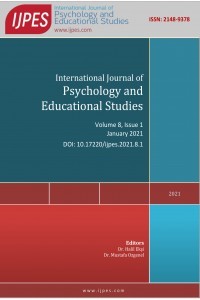The Volunteering Activities of Social Studies Teachers in NGO’s and Their Perception of Volunteering
Social studies teacher, volunteering citizenship,
___
- Akatay, A., Kiray, A., & Özdemir, S. (2016). The effect of NGO education on volunteering tendency: A study on university students. Organizasyon ve Yönetim Bilimleri Dergisi, 8(1), 18-27.
- Coşkun, Z. S. (2012) The effect of community service learning on value acquisitions of preservice teachers (Unpublished masters’ thesis), Institute of Educational Sciences, Department of Educational Sciences, Atatürk University, Erzurum.
- Creswell, J. W. (2016). Research design: qualitative, quantitative, and mixed methods approaches. California: Sage.
- Çakmak-Barsay M. (2019). Sağlık insangücü adaylarında gönüllülüğün tahmin edilmesi. Gençlik Araştırmaları Dergisi, 7(Özel Sayı), 59-69.
- Çarkoğlu, A., & Aytaç, S. E. (2016). Türkiye’de bireysel bağışçılık ve hayırseverlik. İstanbul: TÜSEV Yayınları.
- Demirci, K., Erbaş, A., & Giderler-Atalay. (2009). Investigation of participation potential of university students to the 'NGOs within the organizational citizenship behavior to civic virtue. Journal of Azerbaijan Studies, 12(1-2), 752-767.
- Denny, K. J. (2003). The effects of human capital on social capital: a cross-country analysis (No. 03/16). IFS Working Papers.
- Erdoğan, E., & Uyan-Semerci, P. (2017). Understanding young citizens’ political participation in Turkey: Does ‘being young’ matter?. Southeast European and Black Sea Studies, 17(1), 57- 75.
- Faiz, M., & Dönmez, C. (2017). Opinions of some nationals (North American, South Korean, Chinese, Indian, Turkish and Latin American) on some concepts of citizenship education. Universal Journal of Educational Research, 5(4), 631-640.
- Faiz. M. (2019) Sosyal bilgiler ve gönüllülük, In B. Ü. İbret & S. Kaymakcı (Eds.) Sosyal Bilgiler ve Toplum (s.303-321), Ankara: Pegem Akademi Yayınevi.
- Ellis, A. (2004). Generation V: Young people speak out on volunteering, London: Institute for Volunteering Research.
- Francis, J. E. (2011). The functions and norms that drive university student volunteering. International Journal of Nonprofit and Voluntary Sector Marketing, 16(1), 1-12.
- Hellman, C. M., Hoppes, S., & Ellison, G. C. (2006). Factors associated with college student intent to engage in community service. The Journal of Psychology, 140(1), 29-39.
- Hyde, M. K., & Knowles, S. R. (2013). What predicts Australian university students' intentions to volunteer their time for community service?. Australian Journal of Psychology, 65(3), 135-145.
- Johnson, M. K., Bebe, T., Motimer, J. T., & Snyder, M. (1998) Volunteerism in adolescence: A process perspective, Journal of Research on Adolescence, 8(3), 309-332.
- Kalaycıoğlu, E. (2002). State and civil society in Turkey: democracy, development, and protest. in Amyn B. Sajoo (Ed.), Civil society in the Muslim world: Contemporary perspectives (s. 247- 272). London: I. B. Tauris.
- Karakurt-Tosun, E. (2007). Non-governmental organisations and local administrations in Turkey at the curve of European community. Paradoks, Ekonomi, Sosyoloji ve Politika Dergisi, 3(2). 1-16.
- Kesgin, B. (2016). An assessment of volunteering studies in Turkey. Mimar Sinan Güzel Sanatlar Fakültesi Sosyal Bilimler Enstitüsü Dergisi, 13, 119-131.
- King, M., Walder, L. O., & Pavey, S. (1970). Personality change as a function of volunteer experience in a psychiatric hospital. Journal of Consulting and Clinical Psychology, 35(3), 423-425.
- Leigh, R., Horton Smith, D., Giesing, C., Jose León, M., Haski- Leventhal, D., Lough, B. J., Mwat- hi Mati, J., Strassburg, S. & Hockenos, P. (2011). State of the world’s volunteerism report 2011: Universal values for global well-being. Bonn, Germany: United Nations Volunteers.
- Miles, M. B., & Huberman, A. M. (1994). Qualitative data analysis (2. Edition). London: Sage Publications. Ministry for Welfare and Population Development (1997). White Paper for Social Welfare. Notice 1108 of 1997. Government Gazette, 386(18166). Pretoria: Government Printers.
- Oliner, S. P., & Oliner, P. M. (1988).The altruistic personality: Rescuers of Jews in Nazi Europe. New York: Free Press.
- Omoto, A. M., & Snyder, M. (1990). Basic research in action: Volunteerism and society's response to AIDS. Personality and social psychology Bulletin, 16(1), 152-165.
- Omoto, A. M., Snyder, M., & Berghuis, J. (1993). The psychology of volunteerism: A conceptual analysis and a program of action research. In J. Pryor, & G. Reeder (Eds.), The social psychology of HIV infection (pp. 333–356). Hillsdale, NJ: Lawrence Erlbaum Associates.
- Özer, M. H. (2008). Economical and social functions of NGO’s in today’s World. Electronic Journal of Social Sciences, 7(26), 86- 97.
- Patrick, J. J. (2003). The civic mission of schools: Key ideas in a research-based report on civic education in the united states. ERIC Digest. ED475385, 1-7.
- Patton, M. (1990). Qualitative evaluation and research methods. Beverly Hills, California: Sage.
- Scheibe, K. E. (1965). College students spend eight weeks in mental hospital: A case report. Psychotherapy: Theory, Research & Practice, 2(3), 117-120.
- Sencer, M. (1989). Toplum bilimlerinde yöntem, İstanbul: Beta Yayınları.
- Snyder, M., & Omoto, A. M. (1992). Volunteerism and society's response to the HIV epidemic. Current Directions in Psychological Science, 1(4), 113-116.
- Son, J., & Wilson, J. (2012). Using normative theory to explain the effect of religion and education on volunteering. Sociological Perspectives, 55(3), 473-499.
- Stukas, A. A., Snyder, M., & Clary, E. G. (1999). The effects of “mandatory volunteerism” on intentions to volunteer. Psychological Science, 10(1), 59-64.
- Şahin, O., & Akboğa, S. (2019). The relationship between the state and civil society organizations, and participation in civil society organizations in Turkey. International Journal of Political Science and Urban Studies, 7(2), 405-427.
- Yaşama Dair Vakıf (YADA). (undated). Sivil toplum kuruluşlarına yönelik algı ve yaklaşımlar. Retrieved from https://www.sivilsayfalar.org/wp-content/uploads/2019/10/araştırma-raporu-WEBpdf.pdf. Date of access: 10. 04.2020
- Yerasimos, S. (2001). Sivil toplum, Avrupa ve Türkiye, Türkiye’de sivil toplum ve milliyetçilik. İstanbul: İletişim Yayınları.
- Yönten-Balaban, A., & Çoban-İnce, İ. (2015). Youth voluntary activities in non-governmental organizations and perception of volunteerism: Example of educational volunteers foundation of Turkey (TEGV). Dokuz Eylül University Faculty of Economics and Administrative. 30(2), 149-169.
- ISSN: 2148-9378
- Başlangıç: 2014
- Yayıncı: Mustafa ÖZGENEL
Nuri Berk GÜNGÖR, Serkan KURTİPEK, Ersan TOLUKAN
Urška SİMNOVČİČ PİŠEK, Miha MARİNŠEK
Ümit Doğan ÜSTÜN, Nurullah Emir EKİNCİ, Akay SUNER, Buket AYDEMİR
